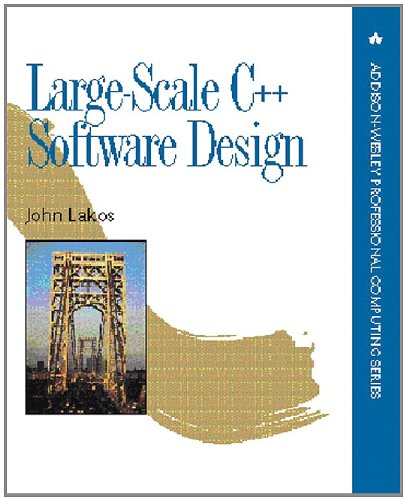Large-Scale C++ Software Design book download
Par mccormick josephine le mardi, juin 21 2016, 22:04 - Lien permanent
Large-Scale C++ Software Design by John Lakos


Large-Scale C++ Software Design John Lakos ebook
ISBN: 0201633620,
Format: djvu
Publisher: Addison Wesley
Page: 870
Aug 25, 2009 - Large-Scale C++ Software Design is a must read book, if you are in software industry. Jun 2, 2006 - Every class drags behind the entire code base. Sometime you may what to move down from Design patterns to low-level physical organization of C++ projects. For long answer, I refer you to "Large Scale C++ Software Design" by John Lakos. Brian McNamara and Yannis Smaragdakis. Stuff like PIMPL, Delegates and Signals and Slots all help in decoupling. In First Workshop on C++ Template Programming, Erfurt, Germany, October 10 2000. An example is Qt Compiler differences or versioning differences - Different versions of compilers, or different compilers altogether, may support functionality/libraries that aren't supported by other compilers. Ability to work in a distributed team. Feb 7, 2014 - Our global partner, a leading financial services company, is looking for an Infrastructure developer (C++) who will be responsible for the development and implementation of customized solutions protecting internet facing applications. The opening is for a member of the Understanding of secure software design principles. Mar 18, 2014 - This article introduces unfamiliar reader to the software Design Patterns and the advantages, as well as problems that they may relate to, when big projects are concerned. Feb 22, 2014 - Large Scale C++ Software Design (John Lakos). A good book I have on my bookshelf is "Large-Scale C++ Software Design" by John Lakos. Dec 27, 2013 - Large-scale C++ software design. Feb 16, 2013 - This blog post is a result of skimming (and some reading) of the book called "Large Scale C++ Software Design", by John Lakos. Working Experience of very large scale globally deployed systems. May 13, 2013 - Recently I've been browsing source code of large applications written in C++ to learn a bit but I couldn't help but notice that most if not all use a lot of IFDEFs and class-less functions (where they could have been class members/methods).